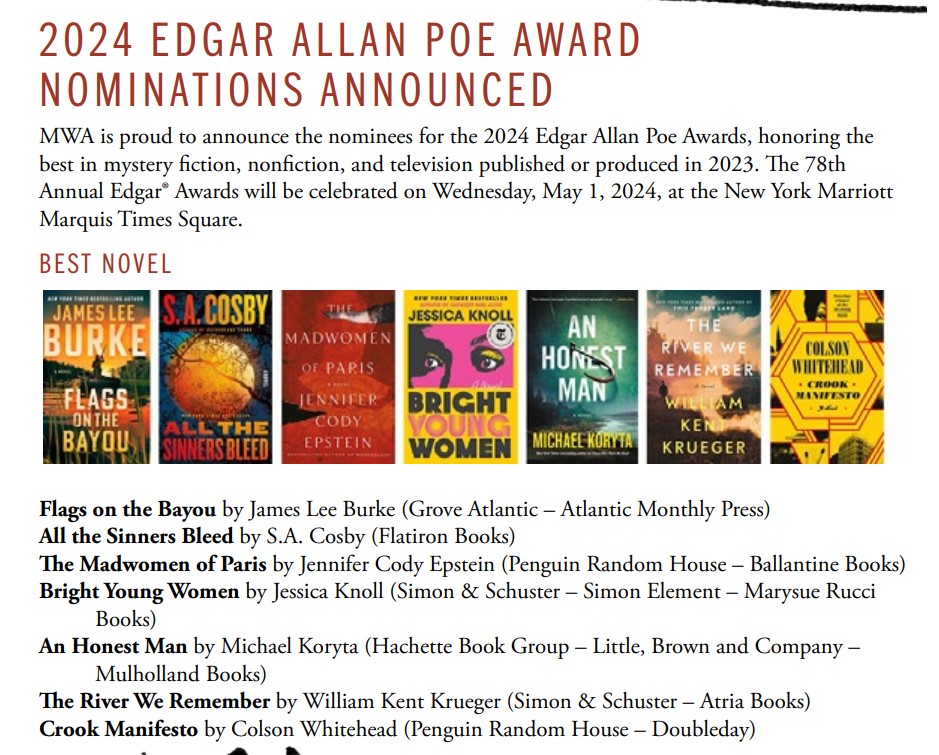The Celwyn Newsletter Issue 10
In this issue: MWA news, editing tips, all about cross-genres, a readers point of view, and author interviews with:
Kemper Donavan, mystery novelist
Katie Andrews cozy fantasy novelist
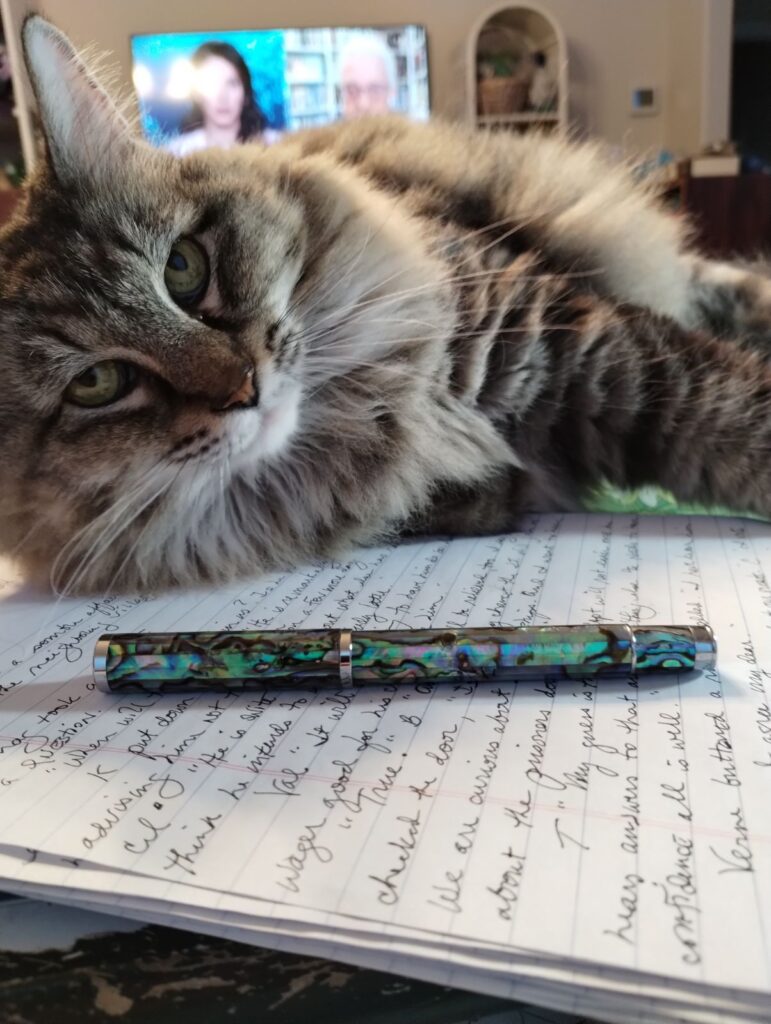
Celwyn’s Cats: Toodles gives new meaning to the term writers block.
Interview with mystery author Kemper Donavan
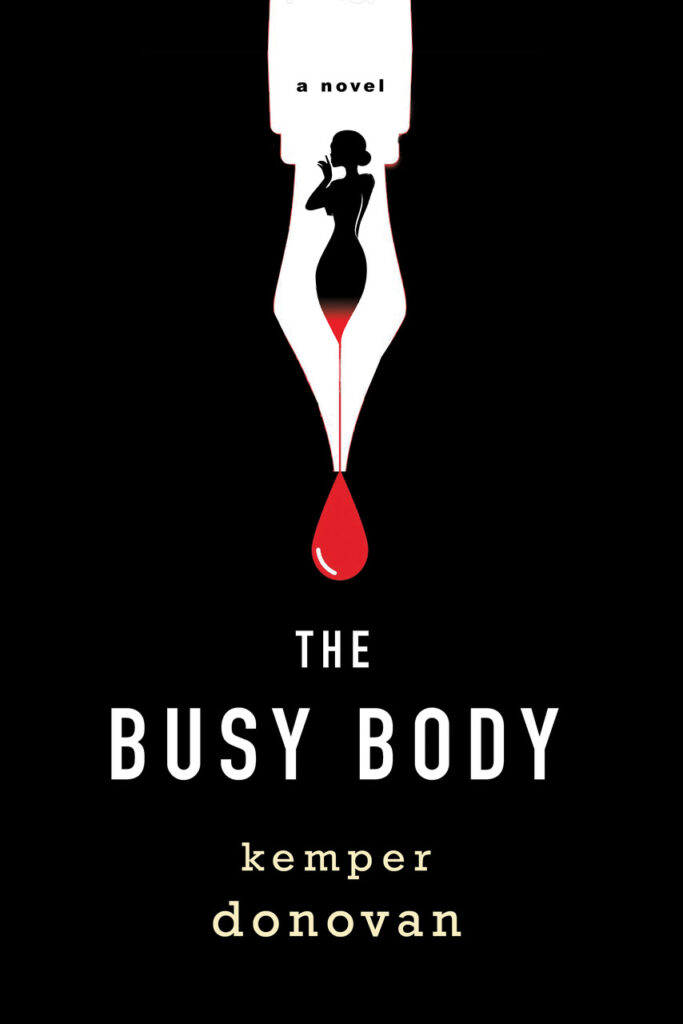
Kemper Donovan is the author of The Busy Body, the first in a series for Kensington Books. He is also the author of the novel The Decent Proposal, and the host of the podcast All About Agatha, dedicated to the one and only Agatha Christie, in which guise he has been featured in the L.A. Times, made appearances on BBC TV and Radio New Zealand, lectured at multiple festivals and conferences, and written for the official Agatha Christie website, agathachristie.com. He attended Stanford University and Harvard Law School, and now lives in Southern California with his husband and two daughters.
Do you have your next book’s plot already in your head? Could we have a preview?
I do indeed; the second book in my series takes place entirely on a boat! What I’ve done is to retain the first-person narrator from my first book—an enigmatic ghostwriter whose name we never learn, and who functions as a Watson/Hastings-type “sidekick” character. But instead of following both her and a detective as a sleuthing pair from book to book, my sidekick will be teaming up with different detectives in each new setting. In her sophomore outing, she’s taken a job as a lecturer on a “literary cruise” populated by fellow writers and the avid readers who pay to learn from them. Naturally, this cruise does not go according to plan….
If a new writer approached you, what advice would you give them?
I would tell them to make sure they enjoy the process of writing, whatever that means to them. There are a lot of different ways to write, and many days I feel like I still haven’t figured out the optimal process! But I try to enjoy it, because now that I’ve had two books published, I can appreciate that it’s the writing process itself that not only forms the heart of the endeavor, but is the only part of a writing career over which a writer has total control. That is a beautiful thing! We writers should do everything we can to wield that power wisely.
Can you see yourself using A.I. in your books?
Absolutely not! And the forcefulness of my answer is why I will be eating my words several years from now! Actually, I’m trying to incorporate the themes (and hand-wringing) around A.I. that we all seem to be engaging in these days into a new mystery, so in a way I suppose I am making use of A.I., just not in the actual construction of the book (perish the thought!).
Kemper’s The Busy Body is a mystery with a contemporary tone/milieu and a classic “puzzle” construction in the best tradition of the Golden Age of Detective Fiction. This is something that Richard Osman and Anthony Horowitz have had astounding success with recently, and it is my intention to reach the same audience with this book. I’ve been an avid scholar of Agatha Christie for seven years now, by way of my podcast All About Agatha, and my book is an homage to the Queen of Crime, deliberately employing some of the tricks and tropes that worked so well for her.
Cross Genre Books: What are they and what should authors and readers know?
Cross genre books marry one or more genres together in a book or series. Common examples are romances with a strong mystery element, horror and sci-fi together, fantasy with romance, the list goes on. So do the challenges and rewards.
Here are some opinions from authors and others closely related to the industry:
I think that cross-genre books are what make us see the value in things we may not normally read. A sci-fantasy book might turn someone who only reads fantasy to sci-fi, or vice versa. I think it also opens up the mind to see things from a different perspective. Sometimes, a near-future romance like the bench, may venture into the thriller genre and dig at the reader’s sense of safety or help them redefine parenting like in a domestic thriller/sci-fi blend. It’s all perspective, but we read to grow, and what better way than branch out? ––Author Ty Carlson, author of Convergence of Gods
I am a huge fan of books that cross genres. Mix in a little romance with a suspense thriller, and you’ve got yourself an intriguing combination. My Sara Browne Series (Flickering Heart, Revive, and Handfast) definitely blends romance with suspense, and I wouldn’t have it any other way. I like to keep the reader guessing while swooning a little at the same time. Fantasy is another popular genre that blends well with romance. Books such as Discovery of Witches, and Twilight have done quite well. Bring it on, I say. —Tricia LaRochelle, author of the Sara Brown Series
We really enjoy cross-genre books… and they aren’t anything new. The romance community has been doing it for ages (romantic suspense, paranormal romance, etc.). Sometimes single genre books can be a bit formulaic. With cross-genre books, that formula can get shaken up a bit. Today a mystery set in outer space, tomorrow a romance set in the multi-verse. Cross genre writing maintains interest, keeps boredom at bay and might earn writers some new readers. Win win all around! —Goddess Fish Book Tours and Blog
I just finished reading James Lee Burke’s “Every Cloak Rolled in Blood.” He writes the mystery/crime novels with Detective Dave Robicheaux as the protagonist. I know what to expect—action, vivid descriptions and complex characters. In “Every Cloak Rolled in Blood,” though, he adds ghosts and spirits mixed with real history giving the story a dreamlike quality. I loved it. His book is a prime example of melding several genres into one great story. The key is in the skill of the writer to make you believe and care enough to relax and enjoy the book. —Linda Norlander, author of Death of Goldie’s Mistress
I believe that cross-genre books are usually enriched by each genre. We know from Diana Gabaldon’s Outlander series how popular it is to combine a number of genres: romance, history, and fantasy. A murder mystery is interesting, but even more so if the whodunnit happens to be on Earth during the year 2500 AD (science fiction). A protagonist in a thriller faces terrible twists of circumstance, and these are amplified if they happen during World War II—a historical period of major upheaval. Ultimately, what matters the most is how well the book is written. —Hilary Tiefer, author of The Secret Ranch
Some might think writing is writing. The genre doesn’t have an impact. After all, it’s the story, not the genre. Right? Not for this author. I discovered shifting from crime thrillers to cozy mysteries posed a new set of challenges. In my thrillers, the emphasis is on the crime, and how the characters solve it. In my cozy mysteries, the emphasis is on the characters, and how the crime impacts their lives. —Anita Dickason, author of Murder’s Legacy
I am a big fan of cross-genre books. I think that it can challenge both the author and the reader to deepen their experience with the characters. It is this genre crossing that can create new ways of approaching tired stories and breathe new life into stale concepts. I always look for stories to take me someplace new and to get a reaction. Staying within a single genre all the time can lessen this experience. —Rob Southgate VP of Marketing at 4 Horsemen Publications
Cross-genre books can work really well! A mash-up between settings, themes, topics, and tropes that are normally siloed off from one another can produce something fresh and exciting, a new reading experience for us all to enjoy. Of course, some combinations either don’t work or are attempted with an unpracticed hand, and the results aren’t always revelatory, but I think of it like fusion cuisine: if we aren’t willing to combine old things to make something new, we’d be missing entire vistas of culinary adventures. As with food, so with books. I’m for it, and I encourage anyone who’s interested to try to make it work!. —Peter Angus, author of Fabyan Place
I personally love cross-genres as they broaden the horizons of the storylines and characters. The more crossovers you have, the less rules you have to play by and it creates a much richer world and intriguing story in my opinion. My favorites include murder mystery and romance. I have read many slow-burning series which not only have the “will they/won’t they” moments but also the “will they even survive” trope which enriches the reading experience so much. As a writer, I find this equally fulfilling as it is challenging since it can invoke an insecurity on whether or not I am satisfying the needs in my own writing when I include multiple genres in my work. —Lucas LaMont, author of Roman’s Reckoning
Cross-genre books offer a fresh and innovative approach to storytelling, providing readers with a unique and engaging experience. By combining elements from different genres, these books have the potential to attract a broader audience, appealing to readers who enjoy diverse storytelling styles. Authors of cross-genre works benefit from creative freedom, allowing them to explore a variety of themes and infuse more creativity into their narratives.
However, these books face challenges in marketing and categorization, making it difficult to find a specific target audience. Additionally, readers may experience confusion when navigating a story with multiple genre elements. Critics might also struggle to objectively assess cross-genre books, approaching them with preconceived notions about specific genres. —Gina Ray Mitchell, Book reviewer and Blogger
Cross genre books provide opportunities to create fresh characters and narrative paths—and can become new genres in their own right, if they take. However, if they don’t, publishers will dread them. Not everybody is Picasso, and not everybody likes cubism—even Picasso’s. In short, I’m all for them—caveat venditor notwithstanding. ––Taggert Rehnn, author of Lucca’s Return
Interview with Mystery Writer Lane Stone

Lane Stone lives in Alexandria, Virginia and Lewes, Delaware with her husband, Larry Korb, and their standard schnauzers, Cordy and Emma. She’s the author of The Big Picture art thriller trilogy. Book one, THE COLLECTOR was followed by THE CANVAS. She is also the author of several cozy mystery series.
She has a post-graduate certificate in Antiquities Theft and Art Crime. She is represented by Birch Literary.
When you do research, do you have (alive) sources that you interview in person or by other means? Do you have a sample of what you have found out that was especially interesting?
Several museum security executives and operations managers have graciously spent time with me. I tried to thank them in the acknowledgment of The Canvas. Sure, I’m in their debt, but the future is, too. What these people do is important because art is important.
If you were to write in another genre a few years from now, what would it be? (this could also be flipped to a genre you wrote in earlier and why you changed to this genre)
I wrote cozy mysteries for years before switching to thrillers. DEAD MEN DON’T DECORATE was my last cozy. I felt restless and knew it was time to make a change. I wanted a bigger playground, for one thing. Now I can use international settings. And I wanted to write about a truly outrageous heroine. Emma Kelly’s secret life is just that. I’m calling this my Larry’s good girl gone bad phase. I’m having a blast.
Have you thought of writing non fiction? If so, what kind and why?
Weeeelll, my agent is about to start shopping a narrative nonfiction project for me. It’s about American nuns in Poland at the start of World War II. The birth of the blitz was in Warsaw in September, 1939. The US Department of State advised them to leave, but they stayed – saving the lives of Jewish children and playing an important role in the Polish Underground. I’ll keep you posted on this on my author Facebook page, Lane Stone Writer.
What are you writing now and what will it focus on? Will it have a solid ending or leave things open for more?
I’m writing book 3 in the Big Picture Trilogy right now. And since this is a trilogy rather than a series, I will hopefully nail the landing. Everything has to be wrapped up. And Emma Kelly has made quite a mess. (Double life, yada, yada.)
In the second installment in the Big Picture Trilogy, The Canvas, (Level Best Books, 11/21/23) Emma unmasks her foe – a family whose name is synonymous with art. The body count rises, culminating in a terror attack outside the walls of the Vatican. And they’re only getting started.
How long can she protect the greatest collection of art the world has ever known and her secret?
Interview with cozy fantasy writer Katie Andrews
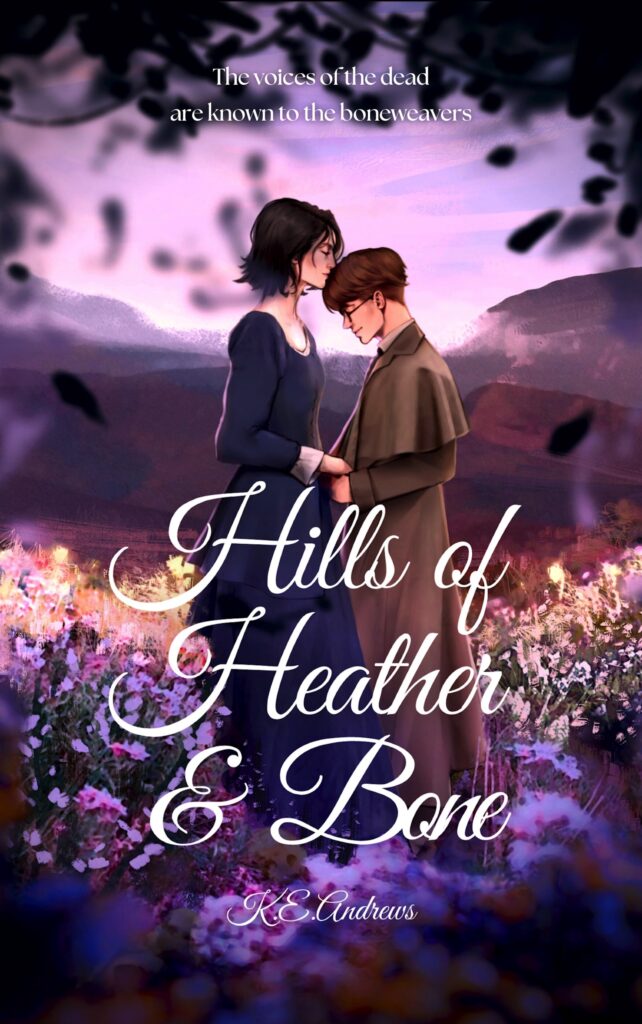
K.E.Andrews has always been an avid reader, which sparked her passion for writing at an early age. Most days she spends her time daydreaming about stories and making mood boards. When she’s not writing, she tends to her plants, plans out her next crafting project, and binge-watches shows on Netflix. She currently lives in Powder Springs, Georgia with her family and three cats.
When you do research, what tools do you use?
I love doing research for my books. Google is my best friend obviously when I need to research niche things like a region’s climate, what plants might grow there, or when the button was invented. I love watching documentaries about cultures and places I’m using for inspiration because I get a visual to help me write the world and scenes I want to include in my book. With Hills of Heather and Bone, I spent some time in Scotland over the yards, and I went on a lot of tours of the country and learned a lot of history that I applied to the story. That was my favorite research I’ve done because I got to travel over the country, take in the scenery, and learn a lot about modern and ancient Scottish culture.
How much do you put yourself in the shoes of the reader? Do you hear anything from them on where they want the series to go?
I usually try to put myself in a reader’s shoes to see how they might react to certain characters or plot twists and what things might be exciting and impactful to read. My beta readers offer great feedback and I try to listen to the suggestions they have. For my trilogy, I’ve heard readers talk about theories they have and what they hope my characters will do and sometimes it’s something I already have planned, but some of it I take and see if that will enhance the story. Most importantly, if I read my story and don’t enjoy it, chances are a reader won’t either.
Andrews’ Hills of Heather and Bone is a finalist in the Self-Published Fantasy Blog Off competition. She is working on a revision to the second book in her dark fantasy trilogy and writing more cozy fantasy short stories.
A Reader’s Point of View.
Questions asked of reader “Beverly”
How much does the hype about a new author affect your choice to try them?
Not at all. Reviews are what attract (or repel) me.
When you are deciding on whether to try a new author, what is the first thing you look for and what makes up your mind to try them?
I don’t care if it is a veteran author whose books I’ve enjoyed or a brand new author—I read the reviews and they guide me as to whether to buy. I also like to page through books in stores—sometimes the first few pages are compelling enough for me to try it. Of course, I make mistakes. If I am still trudging through a book by about P. 50, I just toss it. Life is too short and there are too many good books out there!
Please name your favorite book and why it is your favorite. Did you read other books by this author?
Sorry. I don’t have “a” favorite. When I am reading a book that enthralls me, then that is my favorite at that time: The Goldfinch, Call It Sleep, almost all of Henry James, Middlemarch, Beloved-–more recently, Klara and the Sun, Trust. I do have a favorite genre, however.
What was the most recent book you read that did not live up to its hype? Why?
Ninth Street Women. A history of five women artists who worked alongside the fabled New York abstract expressionists of the 1950’s. As women, most were ignored although ultimately they became an influential part of the revolution in modern art. It is a fat doorstop of a book, filled with intimate detail, sympathetic … but in the end, it is very very repetitive. It needed a good editor. I finished the book but often skipped and scanned.
Right now, what genre are you into and why do you love it?
Memoirs, biographies and autobiographies. When done well, they bring an immediacy and perspective to place and history, and of course, to the dynamics of human relations. The subjects can be famous (the Roosevelts, Auden, Elie Wiesel, Patti Smith) or obscure, but if the book is good, you, the reader, emerge enlightened and enriched.
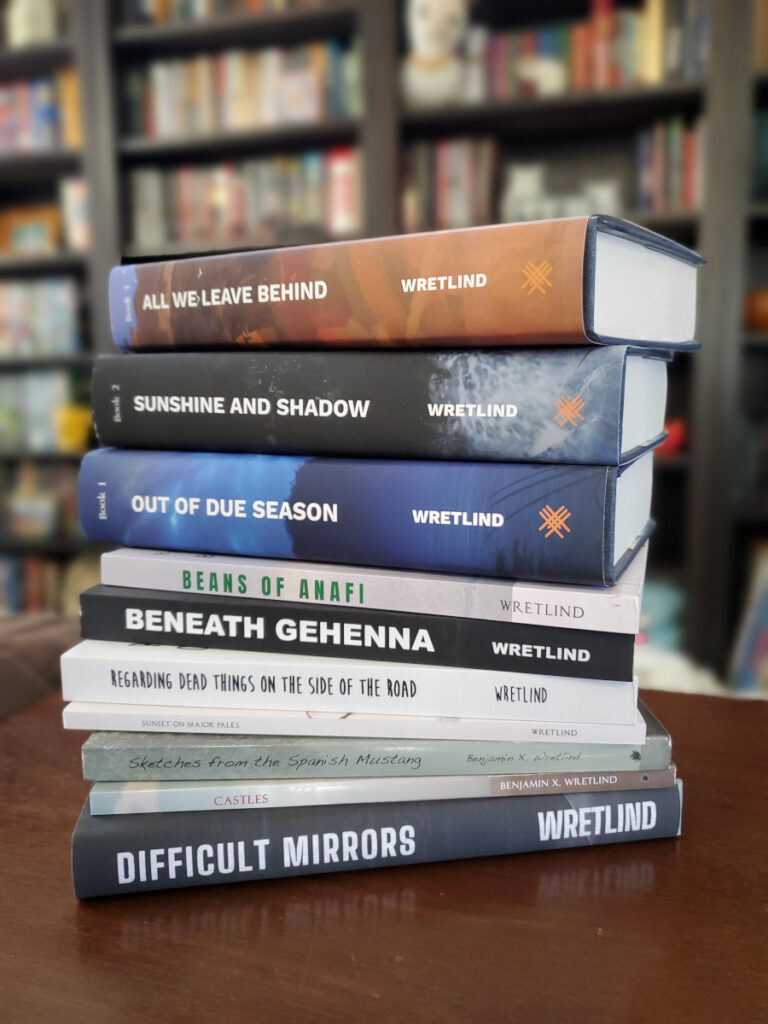
Serving Filet Mignon on a Garbage Can Lid
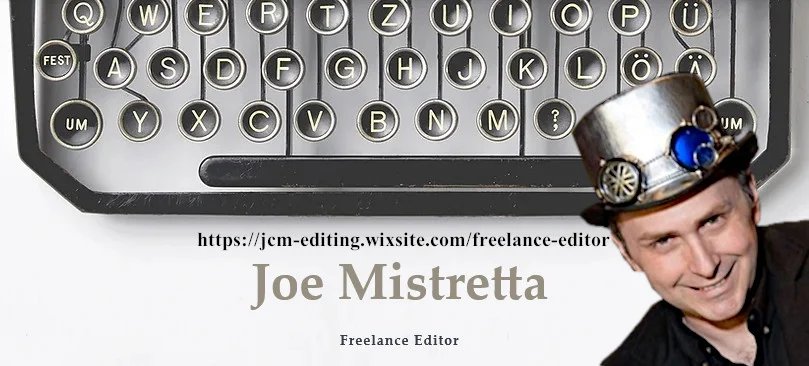
I’ve said it before and I’ll say it again: a cheap tattoo isn’t good, and a good tattoo isn’t cheap. It does not matter if you like tattoos or not, since the saying can be applied to anything that takes skill. There isn’t an excuse out there that I haven’t heard before or said myself when I was a greener writer. If you want to be a rule breaker, you first must understand the rules, how to properly follow them, and establish yourself in the industry as someone who knows the craft. Otherwise, you will come across as an amateur and no one deserving of a second thought. No one wants that. No one wants to write and be dismissed.
Consider this: if you give the meaning of the words you write, the story you weave, and the worlds you build great thought and scrutiny, why would you want to skimp on an editor? You have heard this before, but I am always hearing whispers of not needing an editor or using a family member to proofread.
A few things to that point:
* If you don’t think you need an editor, please step back and take a hard look at yourself and your resistance to seeing yourself as anything but perfect. You are not.
* Every writer, great and small, needs an editor. If you are like me, both an editor and a writer, do not be so bold as to think you can properly edit yourself. As the writer, you are far too close to the story to see what you are missing or words misspelled. Since you know the story in your head, everything that is missing or wrong on the page will be filled in mentally. Not so great a situation.
* If you don’t know the difference between editing and proofreading, please educate yourself on this.
Analogy and example: The writing industry is not just about the words on the page and the story you intend to tell. It is very much about how it is delivered. I have a couple of friends who are in different bands. One friend has toured the world and made a name for himself in his niche genre. We will call him “Sam.” The other has toured Chicagoland. We shall call him “Lenny.” A while back, Lenny asked what he was doing wrong. His band’s music is top-notch. The recording on the album was very professional and sounded great. They were playing shows and had a great stage presence. So I contacted Sam for some advice.
He took a look at their album cover, website, and Facebook page, and listened to their music. He immediately came back to me and said, “They are serving Filet Mignon on a garbage can lid.” They had put all this time and effort (talent, too, but for this story it is not important) into the album, but everything else went by the wayside. He said that no legitimate label with any sort of pull would give them a second look because if they weren’t willing to make themselves look as best as possible, why should a label spend their money on it?
It does not matter how good your story is, just as it did not matter how good their album was. Yes, if a label picked them up, they would re-record everything they already made. But it would not have been money wasted, just as paying an editor in order to present a professional manuscript to a publisher who is then going to send it through multiple rounds of further edits a waste of money, since the money spent is an investment in yourself and your career.
Whether you are trying to be a traditionally published author or a self-published author, presenting your work to a potential publisher, agent, or reader in as professional a way as possible can only help make you look better and more knowledgeable in your craft than handing over something full of errors. I can ramble on for days about the importance of a quality editor and the need for one.
At the end of the day. Finding the right editor will not only make your work look more presentable, but they will also help you tell the story you want to tell in the best voice you have.
I am always open for questions if you have them and am currently accepting new clients if you are looking for an editor. I can be reached at [email protected] or use the link below.
I hope everyone has had a wonderful start to the year. Keep writing!
